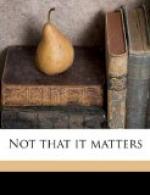I suppose (but I am lamentably ignorant on these as on all other matters) that there was a time when goldfish lived a wild free life of their own. They roamed the sea or the river, or whatever it was, fighting for existence, and Nature showed them, as she always does, the food which suited them. Now I have often come across ants’ nests in my travels, but never when swimming. In seas and rivers, pools and lakes, I have wandered, but Nature has never put ants’ eggs in my way. No doubt—it would be only right--the goldfish has a keener eye than I have for these things, but if they had been there, should I have missed them so completely? I think not, for if they had been there, they must have been there in great quantities. I can imagine a goldfish slowly acquiring the taste for them through the centuries, but only if other food were denied to him, only if, wherever he went, ants’ eggs, ants’ eggs, ants’ eggs drifted down the stream to him.
Yet, since it would seem that he has acquired the taste, it can only be that the taste has come to him with captivity—has been forced upon him, I should have said. The old wild goldfish (this is my theory) was a more terrible beast than we think. Given his proper diet, he could not have been kept within the limits of the terrace pool. He would have been unsuited to domestic life; he would have dragged in the shrieking child as she leant to feed him. As the result of many experiments ants’ eggs were given him to keep him thin (you can see for yourself what a bloodless diet it is), ants’ eggs were given him to quell his spirit; and just as a man, if he has sufficient colds, can get up a passion even for ammoniated quinine, so the goldfish has grown in captivity to welcome the once-hated omelette.
Let us consider now the case of the goldfish in the house. His diet is the same, but how different his surroundings! If his bowl is placed on a table in the middle of the floor, he has but to flash his tail once and he has been all round the drawing-room. The drawing-room may not seem much to you, but to him this impressionist picture through the curved glass must be amazing. Let not the outdoor goldfish boast of his freedom. What does he, in his little world of water-lily roots, know of the vista upon vista which opens to his more happy brother as he passes jauntily from china dog to ottoman and from ottoman to Henry’s father? Ah, here is life! It may be that in the course of years he will get used to it, even bored by it; indeed, for that reason I always advocate giving him a glance at the dining-room or the bedrooms on Wednesdays and Saturdays; but his first day in the bowl must be the opening of an undreamt of heaven to him.
Again, what an adventurous life is his. At any moment a cat may climb up and fetch him out, a child may upset him, grown-ups may neglect to feed him or to change his water. The temptation to take him up and massage him must be irresistible to outsiders. All these dangers the goldfish in the pond avoids; he lives a sheltered and unexciting life, and when he wants to die he dies unnoticed, unregretted, but for his brother the tears and the solemn funeral.




